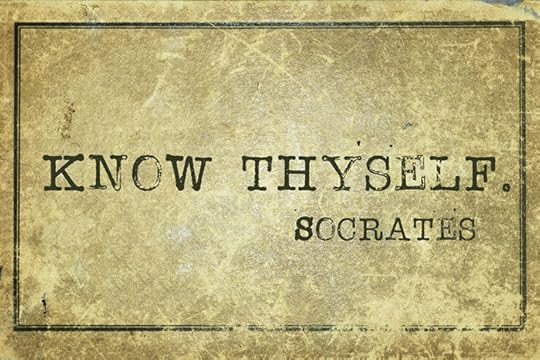Writers: Know Thyself

I don’t consider myself to be a great writer.
Okay, so you’re probably thinking “oh, Mike’s just being humble, of course he’s a good writer, he has a book out after all.” Or you’re thinking “yeah, no shit you’re not a good writer.” If you’re the latter, why are you reading my blog anyway?!
But if you’re the former—I’m not kidding. I’m a good storyteller. In fact, I’d say I’m a very good storyteller. I know how stories function, I know how they work, and I can cop this knowledge because I’ve studied this topic intensely. I’ve read the books on screenwriting, I’ve read the books on literary form, I’ve learned Pixar’s story method—which I think is damn near perfect—like it was tattooed on the back of my hand. So, yes, I’m confident I can tell a story (which is why I’m able to jump between comics, books, and gaming mediums).
But Hemingway I ain’t. Or is it “I ain’t Hemingway?” I think I fell prey a passive construction there. Truth be told, I don’t worry about it! What matters is what sounds good; what matters is being functional.
Now, the point of this piece isn’t to toss the rules of grammar and form out the window. Not in the least. The point, though, is to recognize what your strengths are as a writer and, with that knowledge, make the process of writing easier. Or at least less painful.
Here’s what I mean: While writing Black Star Renegades, I discovered that crafting complex prose with a good many flourishes was not only unsuitable for the book, but it wasn’t natural to me. It was a chore to try and write in this fashion, and the end result, despite my best efforts, wasn’t any good. But somehow, I thought this was how I was supposed to write. And I think a lot of writers get caught thinking the same thing, that it’s our responsibility to weave prose that’s both lyrical and artful. And if you can, if that’s your strength, then that’s exactly what you should do. But me? I discovered that my strength was in getting the hell out of my own way.
What’s funny is that now that Black Star Renegades is out, many reviews have said the same thing: That one of the best parts of the book is the way I’m able to efficiently build the story’s world and convey action that’s clear and concise. And truth be told, I take a lot of pride in that. I strive to be as clear and as compact as possible. I know it might sound trite or perhaps even obvious, but I just say what’s happening, and I leave it at that.
Take for instance the very first sentence of the book:
“Cade ran.”
Really, that's it. "Cade ran." It’s not “Through a winding hallow, as the dusk fell over the dusty bazaar, Cade slapped one foot after another on the solid stone pavement beneath his heavy feet.” That sounds terrible. But those are the kind of sentences I had to fight against myself to exorcise as I dedicated myself to saying what needed to be said in the simplest terms. What was Cade doing in this moment? He was running. That’s it. All the other details, those could be parsed out over the coming paragraphs and pages, but here and now, one thing and one thing only was happening: Cade was running. So, “Cade ran.” Bada-boom, bada-bing.
The same principle of clarity is extended to action sequences in general. In addition to reviews, I’ve had a number of writers contact me saying very nice things about how I convey action in the book, and I’m grateful for the recognition. But the truth is, all I do is keep it simple. I see so many writers try to do more when they should be doing less, especially in action scenes. What I strive to do is capture the fluidity of the moment. It’s all action and reaction and building from there. Like this:
1: Character 1 punches Character 2.
2: Character 2 reacts—by falling back, by absorbing the blow, whatever.
3: The scene builds based on Characters 2’s reaction. If he/she absorbs the blow, then Character 1 is in deep shit; if he/she is knocked back, then Character 1 continues the assault, tries to escape, etc. It all depends on Character 1’s goals. The point is simple: Action, reaction.
But I’ve read books where two characters are fighting, and between points 1 and 2, or 2 or 3, the author stops to give extraneous details about the setting or the inner workings of the character’s mind in this moment. Which is fine, to a degree. But a very limited degree. Because if you have this:
1. Character 1 punches Character 2.
2. Character 1 thinks about how he was punched as a kid in the schoolyard, and how his sled Rosebud was taken from him, and how this has defined him as an adult…
By the time you get to #3, readers will have forgotten the how this all started way back in point #1.
Now, look—I’m not out to set hard and fast rules. I’m just laying out what works for me and why, I believe, people are positively responding to certain aspects of Black Star Renegades. It’s simple: I’m doing what I do best, what comes naturally to me as a writer. And for me, what comes naturally is keeping things clear and simple.
But—and I can’t impress this enough—the discovery of knowing what I do well was born of knowing what I didn’t do well. And that understanding, that awareness, can only come by writing. A lot. The knowledge I want to pass on is simple: Know yourself. Know what your good at, know your weaknesses. Once you have a firm understanding of both, you’re better equipped to write naturally and to the best of your abilities.



